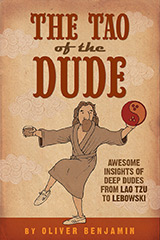The Dude Abides:
Just War Theory, Pacifism, and Dudeism in The Big Lebowski
By Richard Aucoin
Despite the evolution of law and order, the world is still in a state of lawlessness. This is because there is no system of international authority both to justify law and to enforce order. Countries use philosophies such as the Just War Theory to support their violent actions, but despite these theories their actions are nothing more than vigilantism. The international experience has many similarities to the period of American history known as the “Wild West”, where vigilantism ran rampant.
It is fitting that filmmakers Joel and Ethan Coen set their film, The Big Lebowski, in California – a major historical setting of the Wild West. The film is set in Los Angeles, in early 1990s to be exact, but the relevance of the film’s social commentary about morality still resonates today. The film parallels the ethics of individual conduct with the ethics of international warfare. It does this by subtly repeating the motif of the Persian Gulf War of 1991 throughout the film’s narrative.[1] A connection can be made between the film’s characters and different philosophies: in particular, Donny and pacifism, Walter and the Just War Theory, and the Dude and dudeism[2].
This paper argues that there needs to be an acceptance of dudeism at both the individual and international level for the sake of both survival and peace. The world must emerge from the era of the Wild West and erect an international authority, an international sheriff who can bring law and order to this untamed universe. Without this sheriff, pacifists and dudeists do not stand a chance against the “cowboys” who will rule recklessly, endangering everyone’s existence. The idea of an international authority is not just a utopian dream but a feasible and necessary evolutionary step. Just as the construction of nations emerged from city-states and feudal fiefdoms, an international authority must be constructed from nation-states so that peace can be achieved. These peacekeepers will enable civilians to live peacefully and comforted with this protection.
The Big Lebowksi opens with a scene that follows the meandering path of a tumbleweed ball accompanied by the narrated slang of an old cowboy who sounds as if he has heard many “stupefying” stories[3]. The brother filmmaking team frames the film as a Western. This is an interesting choice as the film’s protagonist, the Dude, is arguably the antithesis of the typical Western hero. The cowboy narrator, in fact, resists calling the protagonist a hero. He questions: “What is a hero anyway?” [4] The Dude is just a man, an everyman, a common man. The hero, the Dude, calls himself a pacifist, even though heroes of the Western genre are usually more like an embodiment of judge, jury and executioner rolled up into one. They are persons of action who do not sit back and let others handle the situation. They are seen defending others and risking their lives. In fact, they are usually more like another character in the film, the Dude’s best friend, Walter. In the description of John Wayne or Clint Eastwood-type heroes, words such as ‘justice’ or ‘honour’ can be found almost as abundantly as they are found in speeches by George W. Bush. It is likely that the word ‘pacifism’ does not appear on this list of adjectives. It seems almost an oxymoron to have the protagonist be called a “pacifist hero”. But, this contrast is exactly what the filmmakers had in mind. Through a careful observation of their work one can see a clear picture of the ethics needed Jus ante bellum (before war), Jus ad bellum (preparing for war), Jus in bello (during war), and Jus post bellum (after war).

